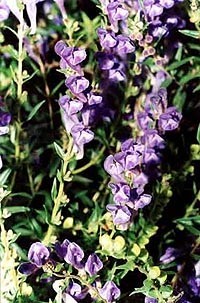Scutellaria sieversii
(Scutellaria sieversii)

Description
Scutellaria is a genus of flowering plants in the mint family, Lamiaceae. They are known commonly as skullcaps. The generic name is derived from the Latin scutella, meaning "a small dish, tray or platter", or "little dish", referring to the shape of the calyx. The common name alludes to the resemblance of the same structure to "miniature medieval helmets". The genus has a subcosmopolitan distribution, with species occurring nearly worldwide, mainly in temperate regions. Most are annual or perennial herbaceous plants from 5 to 100 cm (2 to 39 in) tall, but a few are subshrubs; some are aquatic. They have four-angled stems and opposite leaves. The flowers have upper and lower lips. The genus is most easily recognized by the typical shield on the calyx that has also prompted its common name. The main compounds responsible for the biological activity of skullcap are flavonoids. Baicalein, one of the important Scutellaria flavonoids, was shown to have cardiovascular effects in in vitro. Research also shows that Scutellaria root modulates inflammatory activity in vitro to inhibit nitric oxide (NO), cytokine, chemokine and growth factor production in macrophages. Isolated chemical compounds including wogonin, wogonoside, and 3,5,7,2',6'-pentahydroxyl flavanone found in Scutellaria have been shown to inhibit histamine and leukotriene release. Other active constituents include baicalin, apigenin, oroxylin A, scutellarein, and skullcapflavone. Some Scutellaria species, including S. baicalensis and S. lateriflora, have demonstrated anxiolytic activity in both animals and humans. A variety of flavonoids in Scutellaria species have been found to bind to the benzodiazepine site and/or a non-benzodiazepine site of the GABAA receptor, including baicalin, baicalein, wogonin, apigenin, oroxylin A, scutellarein, and skullcapflavone II. Baicalin and baicalein, wogonin, and apigenin have been confirmed to act as positive allosteric modulators and produce anxiolytic effects in animals, whereas oroxylin A acts as a negative allosteric modulator (and also, notably, as a dopamine reuptake inhibitor). As such, these compounds and actions, save oroxylin A, are likely to underlie the anxiolytic effects of Scutellaria species. Scutellaria also contains rosmarinic acid which inhibits GABA transaminase which breaks GABA down, thus making it available longer.
Taxonomic tree:







